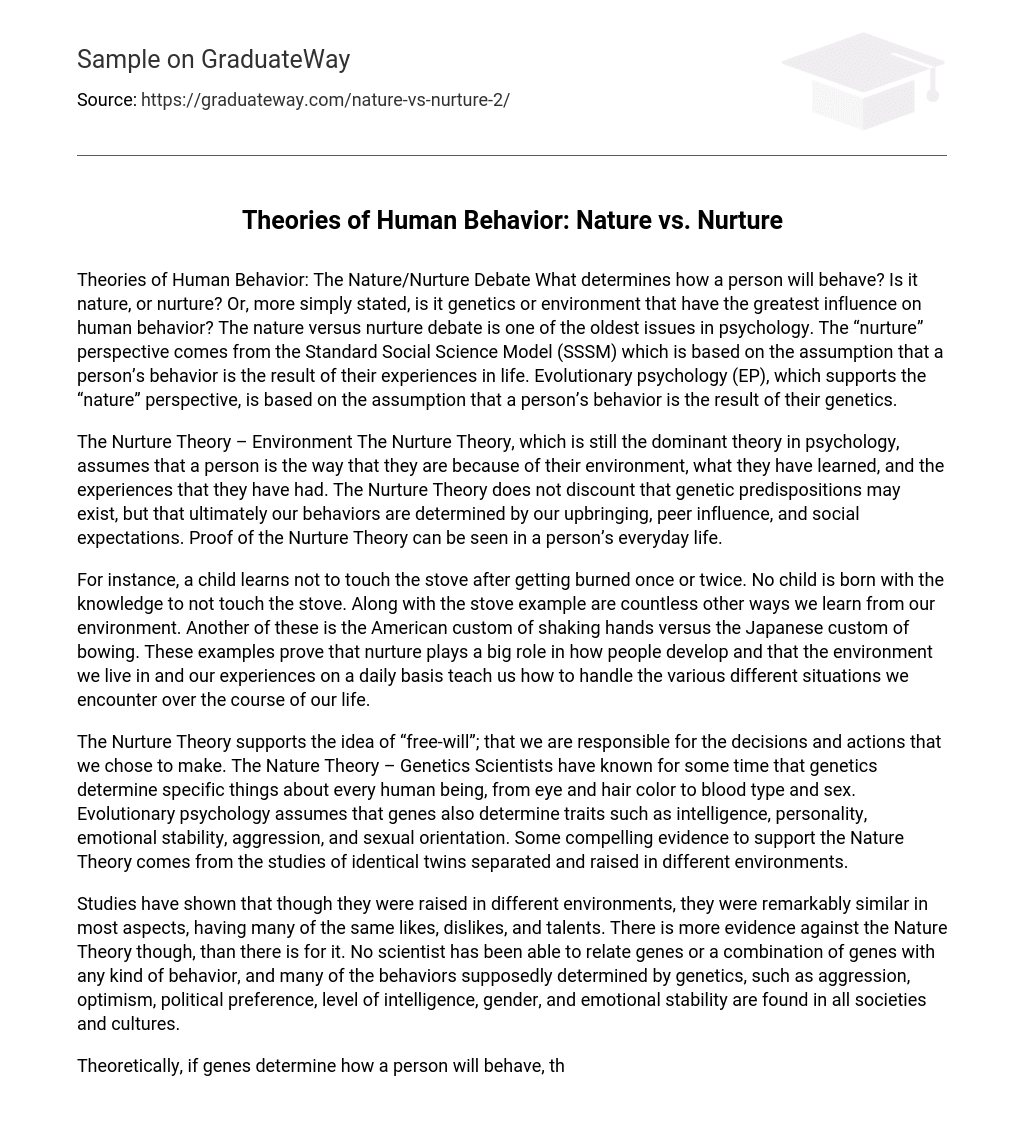Theories of Human Behavior: The Nature/Nurture Debate What determines how a person will behave? Is it nature, or nurture? Or, more simply stated, is it genetics or environment that have the greatest influence on human behavior? The nature versus nurture debate is one of the oldest issues in psychology. The “nurture” perspective comes from the Standard Social Science Model (SSSM) which is based on the assumption that a person’s behavior is the result of their experiences in life. Evolutionary psychology (EP), which supports the “nature” perspective, is based on the assumption that a person’s behavior is the result of their genetics.
The Nurture Theory – Environment The Nurture Theory, which is still the dominant theory in psychology, assumes that a person is the way that they are because of their environment, what they have learned, and the experiences that they have had. The Nurture Theory does not discount that genetic predispositions may exist, but that ultimately our behaviors are determined by our upbringing, peer influence, and social expectations. Proof of the Nurture Theory can be seen in a person’s everyday life.
For instance, a child learns not to touch the stove after getting burned once or twice. No child is born with the knowledge to not touch the stove. Along with the stove example are countless other ways we learn from our environment. Another of these is the American custom of shaking hands versus the Japanese custom of bowing. These examples prove that nurture plays a big role in how people develop and that the environment we live in and our experiences on a daily basis teach us how to handle the various different situations we encounter over the course of our life.
The Nurture Theory supports the idea of “free-will”; that we are responsible for the decisions and actions that we chose to make. The Nature Theory – Genetics Scientists have known for some time that genetics determine specific things about every human being, from eye and hair color to blood type and sex. Evolutionary psychology assumes that genes also determine traits such as intelligence, personality, emotional stability, aggression, and sexual orientation. Some compelling evidence to support the Nature Theory comes from the studies of identical twins separated and raised in different environments.
Studies have shown that though they were raised in different environments, they were remarkably similar in most aspects, having many of the same likes, dislikes, and talents. There is more evidence against the Nature Theory though, than there is for it. No scientist has been able to relate genes or a combination of genes with any kind of behavior, and many of the behaviors supposedly determined by genetics, such as aggression, optimism, political preference, level of intelligence, gender, and emotional stability are found in all societies and cultures.
Theoretically, if genes determine how a person will behave, then a criminal could justify his or her behavior “because they were born that way”, not because they deliberately chose to commit the crime. Will Durant, a proponent of Evolutionary Psychology and the Nature Theory, suggests that humans are inherently acquisitive, pugnacious, sexually driven and self absorbed beings. He suggests that the positive characteristics of cooperation, altruism, and morals were developed through history as humans evolved from a hunter/gatherer society in which these traits were crucial to survival, to an agricultural and eventually civilized society.
As this transition from hunter/gatherer to agriculture occurred, humans began to “settle” and become “civilized”. The social constructs of tribes, villages, and eventually cities, countries, and cultures would come about. The “instincts” of the early human had no place in civilized society, and social order would be destroyed if these “instincts” were left unchecked, so the characteristics of cooperation and altruism were learned and developed to maintain social order in the new “civilized” world.
It is apparent to me that both genetics and environment influence a person’s behavior. Though I am generally predisposed to be a cautious, reserved person, and though I am afraid of heights, I could choose to bungee-jump off a building or go skydiving tomorrow. While a gene may increase the likelihood that you will behave in a particular way, it does not force you to do things. Your actions are not predetermined by your genetic make up, nor is it by the surrounding environment. Your actions and decisions are ultimately, whatever you choose them to be.





